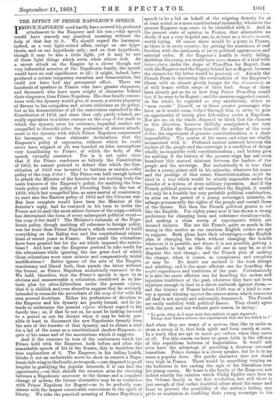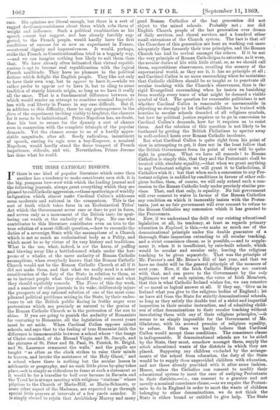THE EFFECT OF PRINCE NAPOLEON'S SPEECH.
FRINGE NAPOLEON need hardly have avowed his profound attachment to the Emperor and his son ;—his speech 'would have scarcely any practical meaning without the help of that key to it. We should regard the harangue, indeed, as a very light-witted affair, except on one hypo- thesis, and on one hypothesis only ; and on that hypothesis, though it may be also a little light, yet it may be one of those light things which swim when others sink. As .a covert attack on the Empire by a clever though not -very influential member of the Napoleonic family, the speech would have no real significance at all ; it might, indeed, have produced a certain temporary sensation and fermentation, but could not have had any permanent effect. There are hundreds of speakers in France who have greater eloquence, and thousands who have more weight of character behind their eloquence, than Prince Napoleon. His close family connec- tions with the dynasty would give, of course, a certain piquancy .of flavour to his outspoken and severe criticisms on its policy, hut as his denunciations of all the restrictions embodied in the Constitution of 1852, and since then only partly relaxed, are -really equivalent to a bitter censure on the coup d'etat itself to .which the dynasty owes its existence, impartial readers are compelled to discredit either the profession of sincere attach- ment to the dynasty with which Prince Napoleon commenced his harangue, or those elaborate declarations that the Emperor's policy of repression, without which he could 'never have reigned at all, was founded on false assumptions 'very humiliating to France, of which the body of the speech virtually consisted. For is it not quite clear that if the Prince condemns so bitterly the Constitution of 1852, he cannot pretend to defend that which the Con- stitution of 1852 was invented to buttress or sustain,—the policy of the coup d'etat? The Prince was bold enough indeed -to attack the Minister of the Interior for not reciting truly the main features of the Emperor's policy, for omitting the free- trade policy and the policy of liberating Italy in the war of 1859, which last compelled him, as mere matter of consistency, to omit also the Eastern policy of 1853 and the Crimean war. But how complete would have been the Minister of the ‘Interior's reply, had he ventured in his turn to invite the 'Prince not to omit the most salient feature of the reign—which has determined the form of every subsequent political event— the coup d'e'tat itself ? The Minister's rationale of the Napo- leonic policy, though omitting all reference to foreign policy, -was far truer than Prince Napoleon's, which ventured to build -everything on the Italian war and the constitutional relaxa- tions.of recent years in France. How could the relaxations have been granted but for the act which imposed the restric- tions ? And how can the Emperor pretend to take credit for the relaxations while ignoring the one great deed of which 'those relaxations were mere minute and comparatively trivial modifications ? Better ignore all the acts of the Empire, Teactionary and liberal both, than parade the latter without the former, as Prince Napoleon audaciously ventured to do. We hold, therefore, that the Prince's speech is open to so -obvious and unanswerable a refutation, considered as an his- toric plea for ultra-Liberalism under the present re'ginie, -that it is childish and even absurd to suppose that he seriously intended to reconcile the precedents of the coup d'etat with his -own avowed doctrines. Either his professions of devotion to the Emperor and his dynasty are purely formal, and he in- -tends to undermine the present re'ginze without regard to his 'family ties • or, if that be not so, he must be looking forward to a period as not far distant when it may be barely pos- sible at least to disconnect the new Napoleonic dynasty from the acts of the founder of that dynasty, and to obtain a trial for a lad of the name as a constitutional shadow-Emperor, in spite of his name and of the associations which it suggests.
And if the rumours be true of the conferences which the -Prince held with the Emperor, both before and after this Temarkable speech of his in the Senate, this is doubtless the -true explanation of it. The Emperor, in his failing health, thinks it not an undesirable move to show in reserve a Napo- leonic left-wing to the family, so to speak,—one disposed to go all lengths in gratifying the popular demands, if it can find the opportunity,—so that, should the occasion arise for choosing between a Napoleonic successor to the throne and a complete 'change of system, the former alternative may be so worked- -with Prince Napoleon for Regent—as to be perfectly con- sistent with the largest conceivable concessions to the spirit of liberty. We take the practical meaning of Prince Napoleon's
speech to be a bid on behalf of the reigning dynasty for at at least a trial as a mere constitutional monarchy, whenever the present Emperor may cease to be identified with it. And in the present state of opinion in France, that alternative no doubt, if not a very hopeful one, is, at least as a derider ressort, worth trying. Of course there would be a party in France, as there is in every country, for getting the maximum of real freedom with the minimum of jar to political appearances and external order. If the Emperor's health is really failing, doubtless his young son would have more chance of a trial with laissez-faire, under the shape of Plon-Plon for Regent, than with the Empress and the Papacy behind her as Regent, because the chance for the latter would be precisely nil. Already the French Press is discussing the eventualities of the Emperor's illness with an almost greedy hunger for the de'nouement, as of wild beasts within range of their food. Some of them have already got as far as how long Prince Plon-Plon would last, if he were to be Regent ; and the answers suggested cannot, on the whole, be regarded as very satisfactory, either to " mon cousin" himself, or to those greater personages who have, as it would seem, hedged through him, in order to gain an opportunity of trying pure Liberalism under a Napoleon. Nor are we, on the whole, disposed to think that the chances in this direction, however skilfully manipulated, are very large. Under the Emperor himself, the author of the coup d'e'tat, the experiment of genuine constitutionalism is a sheer impossibility. The genius of his name and reign are wholly inconsistent with it. Profound mutual mistrust between the leaders of the people and the sovereign is a condition of things wholly incompatible with constitutionalism ; and history goes for nothing if the history of the present reign has not sown broadcast this mutual mistrust between the leaders of the people and the sovereign. But undoubtedly it is true that under a young prince still in his minority, whatever his name and the prestige of that name, Constitutionalism might be tried in a way which would be utterly impossible under the founder of a system of stern military repression. And if the French political genius at all resembled the English, it would not only be a feasible but very probable political combination, to seize on the period of a young sovereign's minority, to enlarge permanently the rights of the people and curtail those of the throne. But then the French political genius is not like the English. For eighty years now it has shown a strong preference for changing form and substance simultaneously, and making a clean sweep of experiments which are deemed failures. Nor are the French quite so much in the wrong in this matter as our cautious English critics are apt to suppose. Both plans have their advantages,—the English plan of changing the blade without changing the handle wherever it is possible, and where it is not possible, getting a new handle to look as like the old one as may be, so as to disguise the real change ; and the French plan of making the change, when it comes, as conspicuous and complete as may be. No doubt our method is the least abrupt and startling, and is the more efficient one for hoarding the useful experiences and traditions of the past. Unfortunately it is also the more efficient one for hoarding the useless and injurious traditions of the past, wherever they have not been injurious enough to lead to a direct outbreak against them,— and the history of France before 1789 was of a kind to con- vey a special warning against the conservatism which conserves all that is not openly and universally denounced. The French are easily surfeited with political fiascos. They clearly agree with the poet, and not without good reason, in saying :
"Ye gods, what do I want with this rubbish of ages departed ; Things that Nature abhors, the experiments that she has failed in ?"
And when they are weary of a system, they like to make so clean a sweep of it, that both spirit and form vanish at once. In a word, they are apt to move per salt ens when they move at all. For this reason we have no great faith in the efficacy of this republican buttress of Imperialism. It would not even have the advantage of providing a decorous external transition. Prince Jerome is a clever speaker, but he is in no sense a popular hero. His public character does not stand very high in France. There would be something verging on the ludicrous in his casting the aagis of his liberalism over his young cousin. He bears to the family of the Emperor, not indeed exactly the relation which Philip Egalite once bore to the Orleans family in the first revolution, but still there is just enough of that rather doubtful odour about his name and fame to prevent the possibility of the nation's feeling any pride or exultation in confiding their young sovereign to ha
care. His opinions are liberal enough, but there is a sort of ragged devil-may-carishness about them which robs them of weight and influence. Such a political combination as his speech cannot but suggest, and has already forcibly sug- gested, to the French people, would hardly have the first conditions of success for so new an experiment in France, —external dignity and impressiveness. It would, perhaps, strike the French as Constitutionalism tried in a beggarly way, —and we can imagine nothing less likely to suit them than that. We have already often intimated that virtual republi- canism is apt to become real republicanism with the logical French multitude. They have no pleasure in the political fictions which delight the English people. They like not only to have their own way, but to appear to have it,—while we rather prefer to appear not to have it, but to cling to some tradition of stately historic origin, so long as we have it really all the same. That is a fundamental difference between us which would render an attempt to combine nominal Imperial- ism with real liberty in France in any case difficult. But if, in addition to this difficulty, there be any grotesqueness in the form of the experiment inviting visibly to laughter, the chances for it seem to be infinitesimal. Prince Napoleon has, no doubt, done his best to secure for the dynasty a sort of chance even in connection with the complete triumph of the popular demands. Yet the chance seems to us of a hardly appre- ciable magnitude, after all. Seedy radicalism, incontinent of speech, casting its aegis over a boy-Emperor, a nominal Napoleon, would hardly stand the fierce tempest of French impatience, ridicule, and wit. Nevertheless, Prince Jerome has done what he could.































 Previous page
Previous page